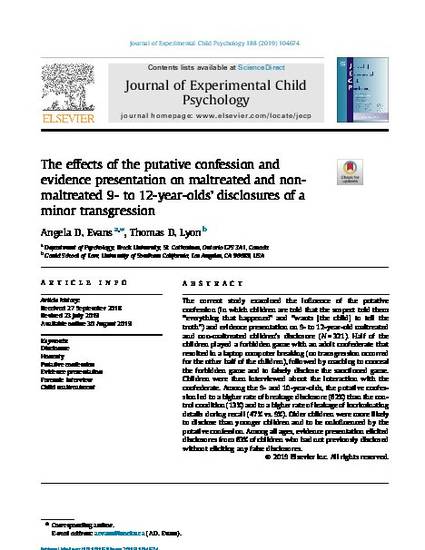
Article
71. The effects of the putative confession and evidence presentation on maltreated and non-maltreated 9- to 12-year-olds’ coached concealment of a minor transgression.
Journal of Experimental Child Psychology
(2019)
Abstract
The present study examined the influence of the putative confession (in which children are told that the suspect told them “everything that happened” and “wants [the child] to tell the truth”) and evidence presentation on 9- to 12-year-old maltreated and non-maltreated children’s disclosure (N = 321). Half of the children played a forbidden game with an adult confederate which resulted in a laptop breaking (no transgression occurred for the other half of children), followed by coaching to conceal the forbidden game and to falsely disclose the sanctioned game. Children were then interviewed about the interaction with the confederate. Among the 9- to 10-year-olds, the putative confession led to a higher rate of breakage disclosure (62%) than the control condition (13%), and higher rates of leakage of incriminating details during recall (47% compared to 9%). Older children were more likely to disclose than younger children, and uninfluenced by the putative confession. Among all ages, evidence presentation elicited disclosures from 63% of children who had not previously disclosed, without eliciting any false disclosures.
Keywords
- Child abuse,
- child sexual abuse,
- child witness,
- putative confession,
- child testimony
Disciplines
Publication Date
Summer July 23, 2019
Citation Information
Evans, A.D. & Lyon, T.D. (2019). The effects of the putative confession and evidence presentation on maltreated and non-maltreated 9- to 12-year-olds’ coached concealment of a minor transgression. Journal of Experimental Child Psychology, 188, 204674. https://doi.org/10.1016/j.jecp.2019.104674
